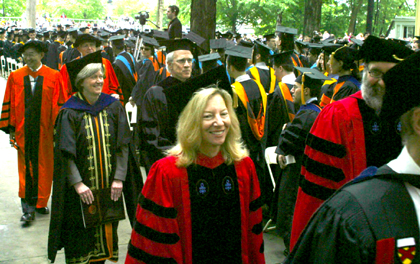
| NEWS |
| |
| FEATURES |
| ENTERTAINMENT |
| COLUMNS |
| CONTACT US |
| HOW TO SUBMIT |
| BACK ISSUES |

caption:
|
Reunions Weekend Closes With Commencement
Matthew Hersh
With the cicadas' song serving as the soundtrack to Princeton University's Reunions weekend, nearly 10,000 members of alumni classes funneled into Princeton to take part in the annual celebration that concluded with yesterday's 257th Commencement.
Before an audience of approximately 8,000 people on the front lawn of Nassau Hall, the University awarded 1,104 undergraduate and 686 graduate degrees in the two-and-a-half-hour ceremony.
Graduating at the top of her class, valedictorian Ruth Tennen, a molecular biology major from Connecticut, addressed an age old graduation question: "What to do next?" She also urged her fellow graduates to form their own conclusions and to "Challenge expectations."
"Our Princeton experiences have taught us how to ... confront traditional thinking with a critical eye," she said. "Yet this willingness to challenge has not come at the expense of respect for our amazing Princeton intellectual traditions."
Ms. Tennen recalled sitting in on Prof. James McPherson's Civil War class in a visit to the University in the spring of 2000. Prof. McPherson, who is retiring from a 42-year tenure at the University delivered his final lecture in April and delivered the Baccalaureate sermon on Sunday (see story on page 9).
"As McPherson exited McCosh 50 for the last time that semester [four years ago], there was a veritable uproar of applause that lingered long after he departed," she said. "Exactly four years later, I returned to McCosh 50 to hear that same lecture, and that same memorable ovation."
Brian Tsang delivered the salutatory address, a presentation, that is traditionally delivered in Latin. However, because few people in the audience understand Latin, copies of the remarks, fully-equipped with footnotes indicating when to laugh, applaud, or holler were provided.
"This year it is our fortune to have commencement coincide with the reemergence of the 17-year cicadas," Mr. Tsang said in Latin. "[They] honor us even now with their incessant love song." The students, as planned, responded with laughter.
Five honorary degrees were awarded in the ceremonies: Edward T. Cone, a professor emeritus in the department of music, received a doctor of letters; Pablo Eisenberg, director of the Center for Community Change, which promotes civic engagement and social justice, received a doctor of laws.
Charles Kuen Kao, having been referred to as the "father of fiber optics" for his work at ITT Corp., and the chairman and CEO of ITx Services in Japan, received a doctor of science; Nannerl Keohane, Duke University's first woman president, was awarded a doctor of laws; and Robert P. Moses, in recognition of his role as a civil rights activist and leader behind the Mississippi Summer Project of 1964, received a doctor of laws. The Summer Project initiative was geared to get the vote out among the black community and to protest racial discrimination.
The complete text of Princeton University
President Shirley Tilghman's commencement address is presented
on page 30.
